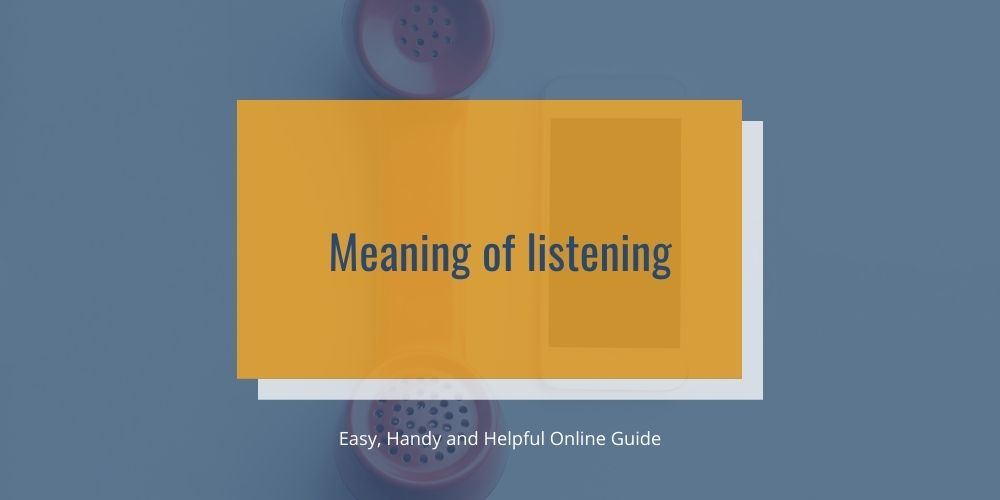
What is Listening?
Listening is through the ears, receiving language. We use our ears to receive individual sounds as we listen (letters, stress, rhythm, and pauses), and we use our brain to translate these into signals that mean something to us.
We learn this ability like babies by listening to individuals who already know how to speak the language. Native speakers may or may not be included in this. For rehearsal, live or captured voices can be listened to. The most important thing is to listen as much as you can to a range of voices.
You need to develop good listening skills to become a fluent English speaker. Listening does not only allow you to understand what you are told by people. It also allows you to talk to other individuals. It lets you learn how to correctly pronounce sentences, how to use intonation, and where to emphasize phrases and phrases. This makes your voice easier to comprehend for those people listening to you!
Also Read: Meaning and Process of Business Communication
The active process of processing and reacting to spoken (and sometimes unspoken) messages is listening. It is one of the subjects studied in the area of language arts and conversation analysis discipline.
Listening is not just hearing what the other person has to say in the discussion. Listening means having an energetic, human interest in what we are told. You can listen to it like a blank wall or like a beautiful auditorium where every sound gets richer and fuller.
Elements and Listening Levels
- Attention-the concentrated awareness of both visual and verbal stimuli
- The physiological act of ‘opening the door to your ears’ Hearing
- Understanding—assigning significance to the sent messages
- Remembering-the retrieval of essential information
Keys to Effective Listening
- To be a successful, active listener, here are a dozen tips:
- If necessary, maintain eye contact with the speaker.
- Pay attention to suggestions and listen to them.
- Find areas that are of concern.
- Content to judge, not execution.
- Don’t disturb; just have patience.
- Keep your points or your counterpoints back.
- Withstand the distractions.
- Pay attention to nonverbal details.
- Keep an open mind, and be versatile.
- Ask questions during breaks and provide feedback.
- To try to see the speaker’s perspective, listen with empathy.
- Anticipate, add up, weigh the evidence, and look between the lines.
Also Read: Why Group Discussions are Important for Students?
The Principles of Listening
Therefore, good listening requires studying body language and identifying differences between verbal and non-verbal signals, as well as exactly what is said at any given moment.
For example, if someone tells you that they are content with their lives, but you should recognize that the verbal and non-verbal messages are in dispute through gritted teeth or with tears overflowing their eyes. They may not mean what they’re doing.
Therefore, listening is not only a matter of using your ears but your eyes as well. Behind very good listening, there are ten values.
- Stop Talking
You will need to explain after the other person has finished speaking to ensure that you have correctly understood their message.
- Prepare Yourself to Listen
Concentrate on the speaker. Placed out of mind other stuff. Other thoughts quickly confuse the human mind-for what’s lunch, what time do I have to leave to catch my train, if it’s going to rain-try to push other thoughts out of my mind and focus on the messages being exchanged.
- Put the Speaker at Ease
Recall their criteria and concerns. To allow them to proceed, nod, or use other gestures or phrases. Maintain contact with the eyes, but do not stare-show that you listen and understand what is being said.
- Remove Distractions
Don’t doodle, shuffle papers, pick up your fingernails, or look out of the window. Avoid unwanted interruptions. These actions interrupt the process of listening and give the speaker signals that you are bored or disturbed.
- Empathise
From their viewpoint, look at problems. Let go of preconceived thoughts. We may empathize with the speaker more thoroughly by keeping an open mind. If the speaker says something that you disagree with, wait and create a case to address what is said, but to keep the views and opinions of others open.
- Avoid Personal Prejudice
Don’t get annoyed, and don’t let the behaviors or mannerisms of the person distract you from what the speaker says.
Some people are, for example, more anxious or shy than others, some have regional accents or repetitive arm movements, some people tend to hurry while talking, some like to sit still. Everyone has a different way of speaking.
Focus on what is being said and tend to disregard delivery styles.
- Listen to the tone
To keep an audience attentive, a good speaker will use both volume and tone to their advantage; in some cases, everyone will use pitch, tone, and voice volume to help you understand the focus of what is being said.
Also Read: 15 Leadership Skills for Career Success
